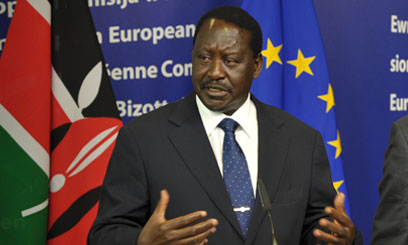 NAIROBI, Kenya, May 18 – Prime Minister Raila Odinga has challenged the National Economic and Social Council (NESC) to find solutions to the perennial food deficit afflicting the nation in the wake of climate change.
NAIROBI, Kenya, May 18 – Prime Minister Raila Odinga has challenged the National Economic and Social Council (NESC) to find solutions to the perennial food deficit afflicting the nation in the wake of climate change.
He asked the council members to deliberate on possible remedial measure that could cushion Kenyans from high cost of foodstuff caused by supply deficit whenever calamities associated with global warming struck.
“President Kibaki admitted that the country was still miles away from attaining food security and revealed that the number of our people dependent on famine relief had increased from five percent in 2003 to six percent currently,” he said.
About 17.5 percent of Kenyans suffers from chronic food insecurity and related nutritional deficiencies, an issue that is compounded by a deficit in the Strategic Grain Reserves currently holding 2.2 million bags, well below its target of four million bags.
The Premier told the 29th council meeting held at the Kenya School of Monetary Studies that solutions must be found to bail the common man out of the food crisis to enhance the living standards of Kenyans.
Raila regretted that food imports took a toll on scarce foreign currency and urged the council to address the management of the post harvest losses witnessed in recent times to reduce the imbalance in foreign trade.
“As we consider the problem of food insecurity, I urge the council members to address the large post harvest losses that exceed the food imports,” he said.
Raila added that the government was keen on bringing the National climate Change Response Strategy to fruition to implement policies that could mitigate and adapt to the phenomena.
He said given the increasing cases of drought brought on by climate change the lifestyles of pastoralists were no longer sustainable and urged them to adapt and incorporate more sedimentary forms of existence.
The looming global economic crisis is cause for addressing growth challenges in the country’s economy he added and urged the forum to reflect on the country’s journey towards becoming a middle income country by in the next 18 years.
He added that as the council considers its policy agenda, it focuses on the 10 percent annual growth rate envisaged in Vision 2030.


































